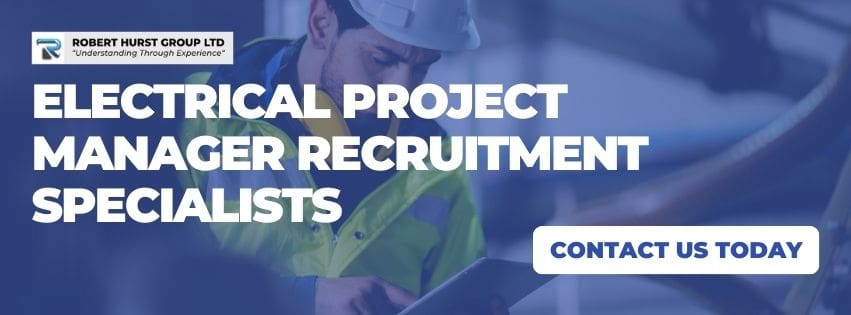The Critical Role of Electrical Project Managers in UK Construction & M&E Sectors
Few roles are as essential as the electrical project manager in the UK’s ever-evolving construction and mechanical and electrical (m&e) sectors. These professionals act as the linchpin of technical delivery, ensuring that complex electrical systems are installed on time, within budget, and to strict regulatory standards. As infrastructure projects scale and client expectations rise, the need for dependable project leadership is at an all-time high.
Electrical Project Manager Recruitment UK is not just about hiring but finding professionals who combine technical proficiency with commercial insight and leadership skills. Skills shortages, increasing project volumes, and a wave of retirements across the industry make recruitment more competitive than ever. The wrong hire can cost a project thousands in delays or compliance breaches, while the right one can streamline delivery and drive reputation. This guide will outline seven expert recruitment strategies to help your business attract top-tier electrical project managers in the UK.

1. Define the Ideal Candidate Profile for Electrical Project Manager Roles
Recruiting without a clear brief is a recipe for wasted time and unsuitable applicants. To secure high-performing candidates, you must first define precisely what success in the role looks like. Consider not just technical qualifications, such as NVQ Level 3 in Electrical Installation, ECS Gold Card status, or familiarity with BS 7671 regulations. I also have leadership experience, contract value previously managed, and sectors I worked in.
Beyond qualifications, think strategically about your upcoming pipeline. If your future work is weighted towards renewable energy or extensive commercial refurbishments, prioritise candidates with matching backgrounds. We’ve found that our clients who map candidate requirements to upcoming project types reduce turnover significantly. At Robert Hurst Group Ltd., we help refine these candidate profiles based on years of successful placements—saving businesses from poor-fit hires.
Additional tip: Don’t overlook cultural alignment. Consider whether your work environment is fast-paced or methodical and whether the candidate’s leadership style suits your wider site teams and company ethos. Long-term compatibility often depends on this less obvious match.
2. Write Job Descriptions That Convert
The job description is your pitch to the market. A generic, jargon-heavy listing is unlikely to attract the calibre of electrical project manager your business needs. Instead, craft a well-structured job ad that clearly outlines the role, project types, expected outcomes, salary banding, and what makes your organisation different.
Incorporate the long-tail keyword Electrical Project Manager Recruitment UK within your copy for better visibility on search engines and job platforms. For instance: “As part of our continued investment in electrical project manager recruitment UK-wide, we’re looking to appoint a project lead for high-spec commercial builds.” Including this phrase helps both Google and niche platforms surface your opportunity to the right candidates.
To improve conversion, include a brief paragraph about your company’s mission, recent project wins, and team culture. Use bullet points to break down essential requirements and make the post skimmable for busy professionals. Adding a call to action like “Apply now or speak directly to our recruitment partner” also boosts application rates.

3. Use Targeted Recruitment Channels That Reach the Right Candidates
Not all recruitment platforms are equal. When hiring for technical and leadership-heavy roles like electrical project managers, advertise where the professionals are paid. Niche UK job boards such as CV-Library, JustEngineers, and CareersinConstruction consistently deliver higher-quality candidates than generalist boards.
For even better reach, combine digital and offline efforts. Network at events like the ECA Industry Awards or regional M&E expos, where talented professionals actively discuss new opportunities. Update your Google Business Profile with open vacancies—this supports your local SEO and improves candidate trust when they research your business.
More importantly, work with a specialist recruiter who knows where to look. At Robert Hurst Group Ltd., we maintain deep talent pools of qualified electrical project managers across the UK, many of whom are not actively job-seeking but are open to new opportunities. These “passive” candidates are often the highest-performing individuals, and gaining access to them can give you a distinct competitive edge.
Don’t underestimate the power of internal referral networks, either. Your existing site managers and tradespeople may know skilled project managers from previous jobs. A referral bonus can help activate your internal network and bring in trusted professionals.
4. Prioritise Speed Without Sacrificing Quality
In a talent-short market, the best candidates don’t stay available for long. Delays in screening CVs, booking interviews, or making offers can result in losing your top pick to a competitor. A well-structured hiring process should be efficient without compromising on the depth of evaluation required for this senior-level role.
Use trusted recruitment partners to help pre-qualify candidates so your internal team only reviews professionals who’ve already met your key criteria. For maximum impact, we recommend setting clear internal SLAs—such as 48 hours from CV receipt to interview invite and 24 hours from final interview to offer.
At Robert Hurst Group Ltd., we support clients by proactively managing timelines. We even schedule interviews and assist with onboarding documentation to reduce admin time. Candidates often cite smooth processes as a key factor in accepting a role.
Additionally, keep lines of communication open throughout. Even if you need more time for internal approvals, updating your preferred candidate regularly demonstrates professionalism and commitment—making them less likely to accept an alternative offer.

5. Offer Competitive Packages Beyond Salary
Salary will always be substantial, but elite electrical project managers are increasingly weighing other benefits when choosing their next role. High pressure and long hours are often part of the job, but perks that support work-life balance, career progression, and well-being are now key differentiators.
Offer a package that includes a company vehicle or allowance, bonus schemes tied to project delivery, and a structured training programme such as ILM or IOSH certifications. Flexible start/finish times and occasional home-based admin days are also increasingly expected, especially for project managers covering large geographical areas.
Robert Hurst Group Ltd. can provide current market benchmarking for electrical project manager salaries and packages, broken down by region. In 2024, the most attractive roles include extras like private healthcare, employee assistance programmes, and structured CPD support. The better the package, the more committed your hire will likely be.
Also, consider branding your package attractively in job posts. Instead of just listing a salary range, say: “Join a fast-moving contractor where project managers are empowered, recognised, and rewarded with clear development pathways.”
6. Build a Strong Employer Brand Within the M&E Sector
When a candidate researches your business, what will they find? In today’s transparent recruitment environment, your company website, LinkedIn presence, and online reviews are part of your employer brand. If this branding is outdated or inconsistent, you may lose out on strong applicants—even if your offer is competitive.
Start by building a dedicated careers section on your website. Include current vacancies, testimonials from site staff and project managers, and a gallery of recent work. Share project milestones on LinkedIn and highlight employee achievements such as qualifications or promotions.
We help our Robert Hurst Group Ltd. clients build employer branding strategies that align with their recruitment goals. For example, we recently worked with a Manchester-based contractor to develop a behind-the-scenes video featuring a day in the life of their senior electrical project manager. This boosted candidate engagement and gave potential applicants a real feel for the role.
Encourage satisfied current employees to leave Glassdoor and Indeed reviews. While you can’t control every comment, responding to feedback shows prospective candidates that your company values improvement and transparency.

7. Work with a Specialist Recruitment Partner
Choosing the right recruitment partner can drastically reduce time-to-hire and improve candidate quality. While generalist agencies may fill vacancies, they often lack the sector-specific knowledge required to assess technical fit and industry expectations.
Robert Hurst Group Ltd. is a trusted name in construction, M&E, and engineering recruitment. We understand the pressures our clients face, from programme deadlines to safety compliance, and we only recommend candidates who meet both technical and cultural requirements.
We maintain relationships with hundreds of qualified electrical project managers across the UK, and many of our placements come through direct contact with candidates not currently active on job boards. We also provide insights into market rates, hiring trends, and role scoping to ensure you make strategic hiring decisions.
Partnering with a specialist recruiter also means peace of mind. We conduct vetting and reference checks and even assist with contract negotiation and onboarding, allowing your internal team to focus on delivery. It’s an end-to-end service designed to support quality hiring outcomes.
8. Evaluate Candidates for Long-Term Value, Not Just Immediate Fit
While hiring the first candidate who ticks the right boxes is tempting, it pays to look further ahead. An electrical project manager may be the right technical fit, but if they don’t align with your company’s values, growth plans, or leadership style, the relationship may not last.
Use structured interviews that go beyond technical questions. Include situational prompts like: “How would you handle a dispute between two subcontractors delaying critical path works?” or “Tell us about a time you successfully brought a project back on schedule.” These give insight into real-world behaviour and leadership ability.
We also advise our clients to include a “culture fit” assessment—sometimes through a second, informal conversation with key site or commercial managers. Many clients implementing this approach have reported improved retention and better team cohesion.
Reference checks should go beyond the basics. Speak to previous clients or site leads who worked closely with the candidate. Ask how they handled pressure, communicated with trades, and managed subcontractor relationships. These insights are invaluable when making long-term hiring decisions.
Conclusion: Secure the Right Talent, Drive Better Project Outcomes
Electrical Project Manager Recruitment UK is a strategic investment in the success of your projects and your business. The right hire will save you time, reduce rework, protect your margins, and enhance your company’s professional reputation. In contrast, the wrong hire can create delays, increase stress, and cost thousands in corrective measures.
By defining a clear candidate profile, optimising your job descriptions, targeting your advertising, and partnering with a specialist like Robert Hurst Group Ltd., you give your business the best possible chance of securing elite-level talent. Add to this a strong employer brand, a competitive benefits package, and a long-term view—and your recruitment process becomes a competitive advantage, not just a necessity.
Ready to find your next electrical project leader? Contact our specialist team today. We’re here to help you build the team that creates your future.
